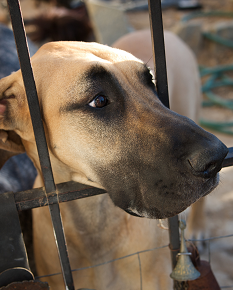|
Animal rescue groups in Los Angeles (LA)
County do a tremendous amount to save the lives
of dogs, cats, and other
animals.
In response to Hurricane Harvey, animal rescue groups
based in LA County have saved hundreds of animals.
They have relocated pets to communities all
across the country, including many here in Southern
California.
When bringing rescued pets into LA County, it is possible to
unintentionally bring in diseases as well. Diseases have been imported in animals
into LA County from other states and other
countries in the past.
Examples of animal diseases
imported into LA
County:

- 2004 - A street dog in Thailand was
rescued and flown into LA County. It was ill
on arrival, and was eventually euthanized in
Santa Barbara County. The dog was diagnosed
with rabies after its death. Twelve people
had handled the dog directly and were
potentially exposed to rabies.
- 2005- Numerous dogs rescued from
Louisiana because of Hurricane Katrina were
infected with heartworm. It is suspected
that the surge in importation of
heartworm-infected dogs to LA County
increased the risk of heartworm transmission
locally, because heartworm-infected dogs
that do not get treated become reservoirs
for the parasite.
- 2017- Dogs rescued from Asia were sick
with Canine Influenza H3N2, a new and highly
contagious viral infection in dogs and cats.
An outbreak occurred, causing 35 dogs to
become ill, including 2 that died. The
outbreak was successfully stopped by
quarantining all sick and exposed dogs (52
total) at their homes.
Steps to Prevent Disease Importation
and Spread
In order to prevent the spread of disease and
keep our communities safe, there are steps both
rescue groups and adopters can follow to reduce
the risk of spread of disease. It is
important to remember that while rescuing
animals, it is the rescuer's responsibility to
keep the local pet community safe from diseases
as well.
Steps for Animal Rescue Groups
- Work closely with a
veterinarian. Have the
veterinarian examine all rescued
animals.
- Include testing and
treatment of animals in your
budget.
- Quarantine rescued animals.
This means keeping them separate
from local animals, and out of
public areas. Quarantine healthy
pets for at least 14 days, and
sick pets for at least 30 days,
and be prepared for longer
quarantines if an outbreak
occurs.
- Learn about the diseases
that are prevalent in the region
from which the animals are being
rescued. Ask a veterinarian from
that area. Have a protocol in
place to assure that any needed
vaccinations and tests are
performed. For example:
- All pets are
vaccinated for
rabies, or have
documentation of
earlier
vaccination.
- Animals that
have been
rescued from
Texas following
Hurricane Harvey
should be
examined by a
veterinarian,
screened for
heartworm and
treated, if
necessary.
- Dogs being
rescued from
Asia should be
vaccinated
canine influenza
H3N2. They
should receive
the vaccination
twice (2-3 weeks
apart) before
being imported.
Steps for Adopters of Rescued
Animals
- Obtain copies of all
veterinary records for the pet
from the Rescue Group.
- Take your new pet to a
veterinarian for examination.
Ask your veterinarian what you
need to do to keep your new pet
healthy, as well as any steps you need
to take to keep your other pets
healthy. For example, your
veterinarian may potentially
recommend vaccinations for the
new pet and pets you already
have.
- Keep your new pet away from
other pets until you are sure it
is healthy, or at least 14 days.
For example, do not take it to
dog parks, or boarding or
grooming facilities until it has
stayed healthy for two weeks.
If you have any questions about brining
rescued pets into LA County, ask to speak to the
LA County Veterinarian On Call Monday through
Friday, between 8 am and 5 pm at 213-989-7060.
Last Updated: September 28,
2017
|